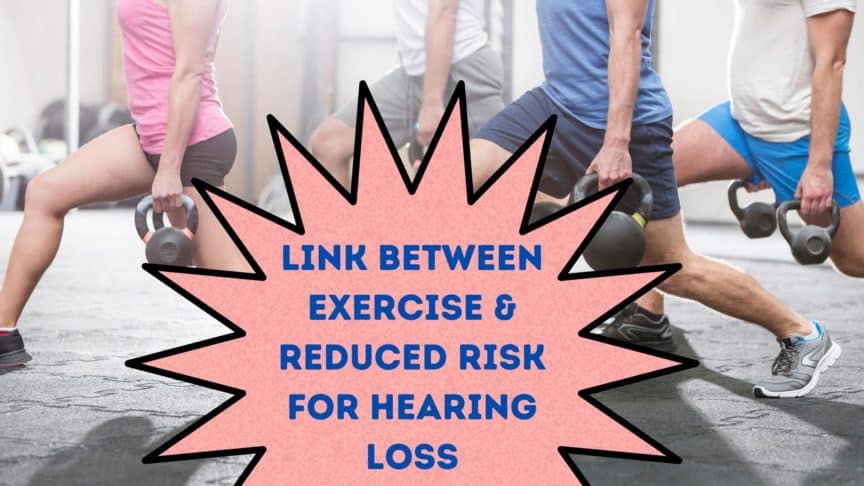- How to Care for Infants With Hearing Loss - April 15, 2024
- Hearing Aid Tips for Runners - April 5, 2024
- Overcoming Misconceptions Around Hearing Aids - March 27, 2024
Regular physical activity has been found to help us preserve our physical health as we age. Exercise improves circulation, strengthens joints, bones, and muscles, and can even boost your mood. Is there anything that exercise cannot accomplish?
Exercising can help you hear better
Researchers have found a link between physical activity and better hearing skills. According to a new study, regular exercise may help reduce the risk of hearing loss.
In an experiment with mice, a team from the University of Florida’s School of Medicine recently published their findings in the November Journal of Neuroscience, demonstrating a substantial correlation between exercise and hearing health.
The research was carried out by a team led by Dr. Shinichi Someya as part of the University’s Institute on Aging. It examined hearing loss in sedentary and active mice. Dr. Someya’s team discovered that mice who did not exercise had an increased loss of hair cells and trial capillaries in their auditory system when investigating the reason for hearing loss. Mice who regularly ran on a running wheel developed about 5% hearing loss over time. Still, inactive mice developed hearing loss at roughly four times the rate, around 20%.
The delicate components of our auditory system are crucial to our hearing health. Three complicated areas of the inner ear were of particular interest to Someya’s team.
- Hair cells are filament-like receptors tuned to receive specific hearing frequencies and transmit their signals to the brain.
- Sound waves change the pressure in the cochlea, which activates the hairs. The ear is supplied with oxygen and nutrition through strial capillaries related to the circulatory system.
- The spiral ganglion neurons are a nerve cluster in the inner ear’s root that sends sound wave interpretations to the brain, bridging the gap between how the ear hears and how the brain interprets sound.
These three components deteriorating would significantly impact hearing, resulting in irreversible damage.
Exercise and how it helps prevent hearing loss
The ears’ delicate and sensitive parts naturally deteriorate with age. Over 70% of persons over the age of 70 have some degree of hearing loss, much of it due to the steady deterioration of our inner ear’s performance.
According to Dr. Someya’s team, age-related inflammation may significantly contribute to this harm, lowering performance or impairing cell function. Their findings in mice are encouraging: exercising animals had half as many signs of inflammation as their sedentary counterparts as they aged. This could be good news for people, suggesting that regular exercise can protect our bodies from dangerous inflammation. By reducing our risk of inflammation, we may be able to counteract some of the same aging effects seen in mice while also protecting our ears from unnecessary harm.
As of yet, the University of Florida experiment has only been carried out on mice. The active mice were given a running wheel as an exercise item, while the idle mice were not given one. Additionally, mice were kept separately so individual activity on the running wheels could be monitored. Mice were tested at different ages up until they were 24 months old. Mouse activity peaked around six months (the equivalent of a 25-year-old human).
These juvenile mice averaged nearly seven and a half miles per day on their wheels when they were at their most active. The study discovered that older mice with running wheels exercised at roughly a third of the rate of their younger counterparts, averaging about two and a half miles of wheel movement per day. Mice’s hearing sensitivity to various frequencies was also tested as they grew older. The older mice, who were measured at two years of age, had a significant difference in their hearing abilities and the physical makeup of their inner ears. Mice that exercised had healthier ears and better hearing acuity.
It can be challenging to identify how much energy our bodies expend to maintain our sense of always hearing “on” because detecting sound appears to be a passive activity. We don’t always pick up on all the heavy lifting they have to perform every day since there are no training gyms for our ears. Hopefully, this study, titled “Effects of Long-Term Exercise on Age-Related Hearing Loss in Mice,” is only the start of a better understanding of the links between exercise, aging, and healthy hearing.
If you feel like your hearing isn’t what it used to be, contact us today to set up a hearing test.

